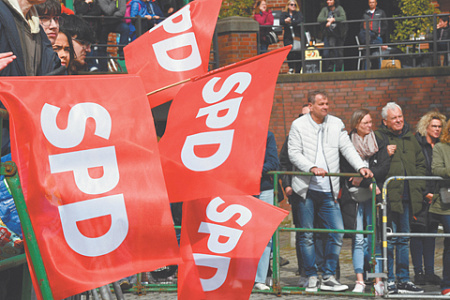
Friedrich Merz, chairman of the Christian Democratic Union, is expected to be elected Chancellor of Germany on May 7. Earlier, he expressed his intention to complete the formation of the government before Easter, April 20. However, the coalition agreement agreed on the day before has yet to be approved by members of the Social Democratic Party of Germany (SPD), as well as the governing bodies of the CDU and the Christian Social Union (CSU).
There are various procedures for approving a coalition agreement in Germany. In the CDU, it will be approved on April 28 by the so-called small congress, which is a meeting of various party bodies. The SPD will conduct a written survey of all 400,000 members within two weeks, which will end on April 29. For the CSU, the decision of the party’s board is enough.
In connection with the upcoming discussions in the parties of the agreement reached, the speeches of the leaders of the CDU, CSU and SPD deserve attention. All of them justified the numerous deviations from their own election programs resulting from the Russian Federation’s actions in Ukraine and the imposition of duties by the United States on German goods. Markus Zeder, the head of the CSU, who spoke the longest, called Moscow’s actions a threat to Germany from the East and called for strengthening the Bundeswehr. At the same time, in a speech by Lars Klingbeil, co-chairman of the SPD, there was a demand from the future government of Germany to build bridges, including to the East.
Friedrich Merz tried to suggest that he had managed to defend some of his positions from the election program. In particular, we are talking about tightening migration policy, reducing income taxes and some relief for private capital. However, Klingbeil, who will take over the posts of finance minister and vice chancellor, somewhat dampened Merz’s hopes, bluntly stating: “As far as the budget allows.” After all, despite half a trillion euros of extra-budgetary funds designed for 12 years, the US trade war against the EU and China has already reduced these additional finances to almost zero. The money will be used to cover the expected losses.
Observers of the Second Channel of the German television ZDF, taking into account the concentration in the hands of the CDU and the Foreign Ministry, and the federal Chancellor’s office (this happened for the first time in the last 16 years), tend to assert, based on Merz’s earlier statements, that he intends to direct efforts in foreign policy to strengthen the Berlin–Paris–Warsaw axis. At the same time, it should be expected that Klingbeil, who initially applied for the foreign ministry, will actively engage in international affairs, including Russia.
Some representatives of the German media believe that the SPD and CSU have benefited from the coalition negotiations. The Social Democrats were initially supposed to receive five ministries, but eventually received seven. Moreover, finances turned out to be in their hands, since in addition to the Ministry of Finance itself, they also received the Ministry of Labor. And this is the agency with the largest budget, as it also manages pension provision.
Zeder managed not only to get three ministries – interior, agriculture, research and space – but also to achieve benefits for gastronomy. We are talking about reducing VAT to 7% from 2026 and the return of all benefits abolished by the previous government for peasants. This strengthens its position in Bavaria, where these industries are particularly developed.
The new faces in the future government include CSU representative Dorothea Behr, who will become head of the Ministry of Research and Space, as well as Karin Prin (CDU) as Minister of Family Affairs. The Ministry of Justice, which is seen as an alternative agency to the Interior Ministry, headed by Alexander Dorbrindt from the CSU, will be in the hands of the Social Democrat Dirk Wiese or the judge from the state of Brandenburg, Sonja Eichwede.
So far, Armin Lachette has been named as the foreign minister, noting that the last time the Christian Democrat held this post was in 1961-1966. Discussions on personnel are continuing, and the final composition of the government will be known only in early May.
